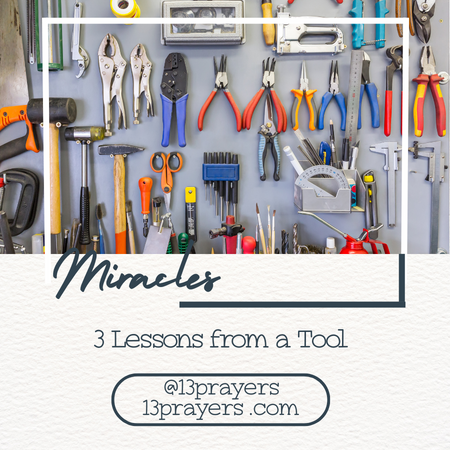Need a tool?
That tool is not for me
Growing up, my Dad had a large toolbox. But we lived under a single mandate: don’t touch the tools! If you need a hammer, ask dad, and he will hammer for you.
I finally figured out his possessiveness when I got to college. Dad had given me a minimal tool box – just the basics. It came in quite handy. But, when word spread in the dorm that I had a tool or two, soon people were asking to borrow them. I worried they wouldn’t be returned, so I became a handyman. And my tool-owner light bulb came on.
He lost a tool.
In 2 Kings 6, there is a very short story (only 7 verses) about an ax and the prophet Elisha. You see, the number of students (of the prophets) had grown to the point that they needed to expand their living space. So they came to Elisha with a solution: they would each go and cut down a tree and bring it back for a community building project. Elisha agreed and even came with them. (v.1-2)
They went to the banks of the Jordan River and started work (v. 4) One young man’s ax head fell into the river and sank into the muddy, flowing water. To make matters worse, he had borrowed the tool!(v. 5)
He tells Elisha. The prophet gets to the location. Then he gets a stick/branch and throws it into the water.
And the ax head floats to the surface! Elisha tells the man to lift the tool from the water. So he did.
And that’s it. Originally, what I got out of the story is that God cares about our minor concerns. I’ve seen it myself when I find the perfect parking space after a long, frustrating search. But I always check some commentaries as I write, and I found several interesting insights on this “lost tool” saga.
1. The Heavy and Hard Tool
This insight focused on the lost portion of the tool itself. An ax head is hard so it can work for its Owner. Then it separated from the handle. No longer useful, it is lost in the mud. With divine intervention, it becomes useful again. We are the ax head. When we loosen our grip on God (who makes us useful), our hardened hearts end up lost in the muddy waters of this world. It is only through the work of Jesus that we can return to the Owner to once again be put to use.
2. Secure Your Ax Head!
This insight focuses on the connection between the handle and the working end of the tool – the ax head. The two weren’t in stable, connected contact. And the ax head gets lost.
Again we are the ax head. We get separated from Father God and the power of the Holy Spirit when we are disobedient, distracted by worldly stuff, not spending time in prayer and Bible study, or a lack of faith.
Christ does His work, but we must do our own. We must confess whatever sin pulled us away. Then God will forgive us and restore our joy and the power to continue His work once again.
3. The Saving Branch
This was my favorite insight: it’s all about the branch.
Note that the stick – or branch – having been cut down, was no longer part of the living tree. The branch was thrown into the muddy water of the Jordan. It lifts up the tool, restoring it for the Owner to use.
This is a picture of Jesus! He came to earth as a man, leaving Heaven. He embraced death and lifted us from its jaws so God can use us.
Think it’s a stretch? Check out what the Father says in Zeph 3.8b, “…behold, I will bring forth My servant the Branch.”
So any way you look at it, we don’t have to live a life drowning in the muddy waters of this world. We can be pulled from the watery jaws of eternal death by Christ’s blood on the cross.
What it means for me:
- God does care about our daily concerns, but He is more interested in our eternal circumstances.
- I must use daily time with God – through Bible study and prayer to maintain a firm grip on God.
- God isn’t going to let me go. In John 10.28, Jesus says, “I give them eternal life, and they shall never perish; no one will snatch them out of my hand.” If I lost my connection with God, it’s all on me. So I need to be watchful that my heart doesn’t become hardened.
- I need to praise God daily for the gift of The Branch, His Son, whose sacrifice drew me from the muddy depths of sin and death.
